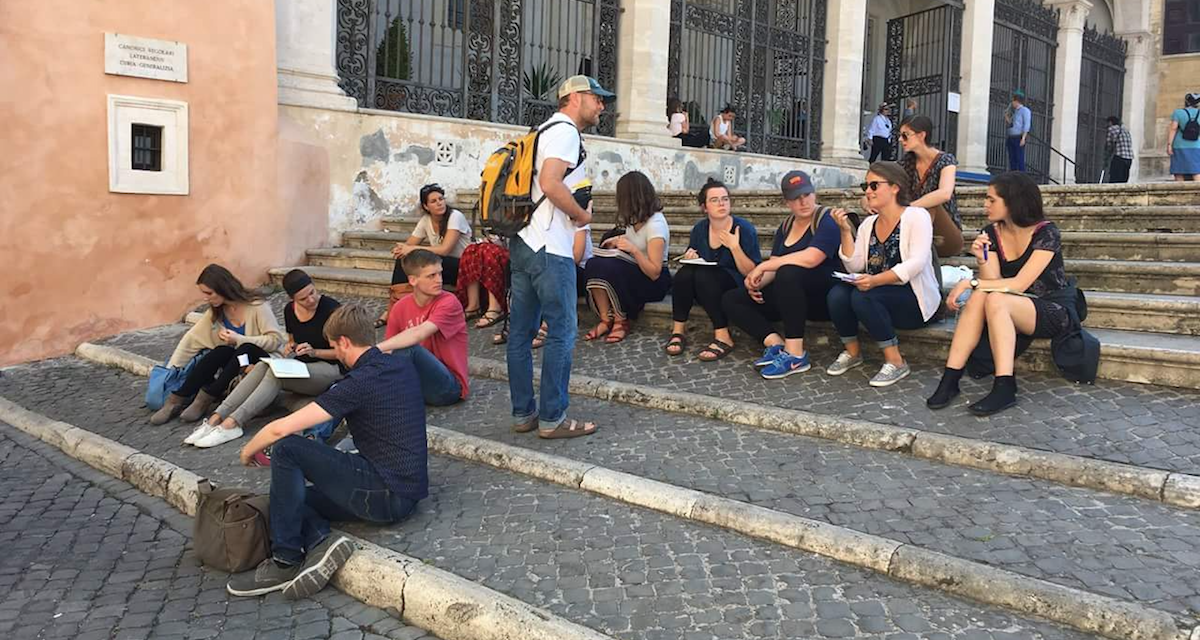Romans IN Rome: New Opportunities Abroad for Biblical Studies
Dr. Steven Hunt, professor of New Testament, taught his new class “Romans in Rome” for the first time this summer as a part of the Gordon IN Orvieto program.
Eleven students (nine of whom were from Gordon, and two from Messiah College) did more than just study Paul’s letter to the Romans; they read it aloud on the site of a first-century house church, where it’s possible early Christians heard the epistle for the first time.
The class started with an initial weekend trip from Orvieto—located 79 miles north of Rome—to Pompeii, Paestum and Naples. There, they visited museums, urban ruins and the remains of sixth-century B.C. Greek temples, so well-preserved that they served as excellent models for class to envision what the first-century temples in Rome would have looked like.
They then took twice-weekly trips for four weeks from Orvieto into Rome itself. Dr. Hunt and his students would catch the earliest train in, the last train out and reconvene for class the next day. Back in Orvieto, participants debriefed their trips over espressos.
Dr. Hunt called the experience a “real academic highlight.” His scholarship on the cultural-historical contexts of New Testament manuscripts is well-known both within and beyond the Gordon community. For “Romans in Rome,” though, Dr. Hunt gained a unique depth of insight by intensively committing to an ancient Roman mindset for a period of time. While on sabbatical in the fall of 2015, he moved his family to Rome for three months. The inspiration behind the body of research he conducted there was this new course he had long hoped to create.
In the course, Dr. Hunt seeks to “emphasize the context” of the letter. “When Paul gets to chapter 9, for example, and he begins to talk about Jacob and Esau, one has to wonder why. Might part of the answer be related to the traditions about Romulus and Remus and the eventual founding of Rome?” This context, he explains, illuminates much of Paul’s rhetoric in the epistle as anti-imperial. “In the simplest form, you can say ‘If Jesus is Lord, then Caesar isn’t.’”
“Romans in Rome” is making way for biblical studies students who could not otherwise experience a semester abroad in Italy. “Romans in Rome was the only reason I could go to Orvieto,” said Kara Applegate ’18 (biblical studies and English), whose Orvieto classmates came from a diverse cross-section of academic majors.
Applegate recalled reciting the Lord’s Prayer as she made the traditional kneeling ascent up the Santa Scala—sacred stairs considered to have been brought from Jerusalem by St. Augustine’s mother. Every weary mile of walking was worth it, she thought as she stood inside the traditional burial place of Paul himself, known as the Basilica of Saint Paul Outside the Walls. It houses a relic said to be the chains Paul wore during his final imprisonment. Standing there, she took a moment to read 2 Timothy—the last letter Paul wrote before he died.
Dr. Hunt says he looks forward to the countless cultural and textual insights from the experience yet to reveal themselves—many of which he expects will surface in his other biblical studies classes here on campus.
By Grace Shaw ’19, philosophy
 The Bell
The Bell